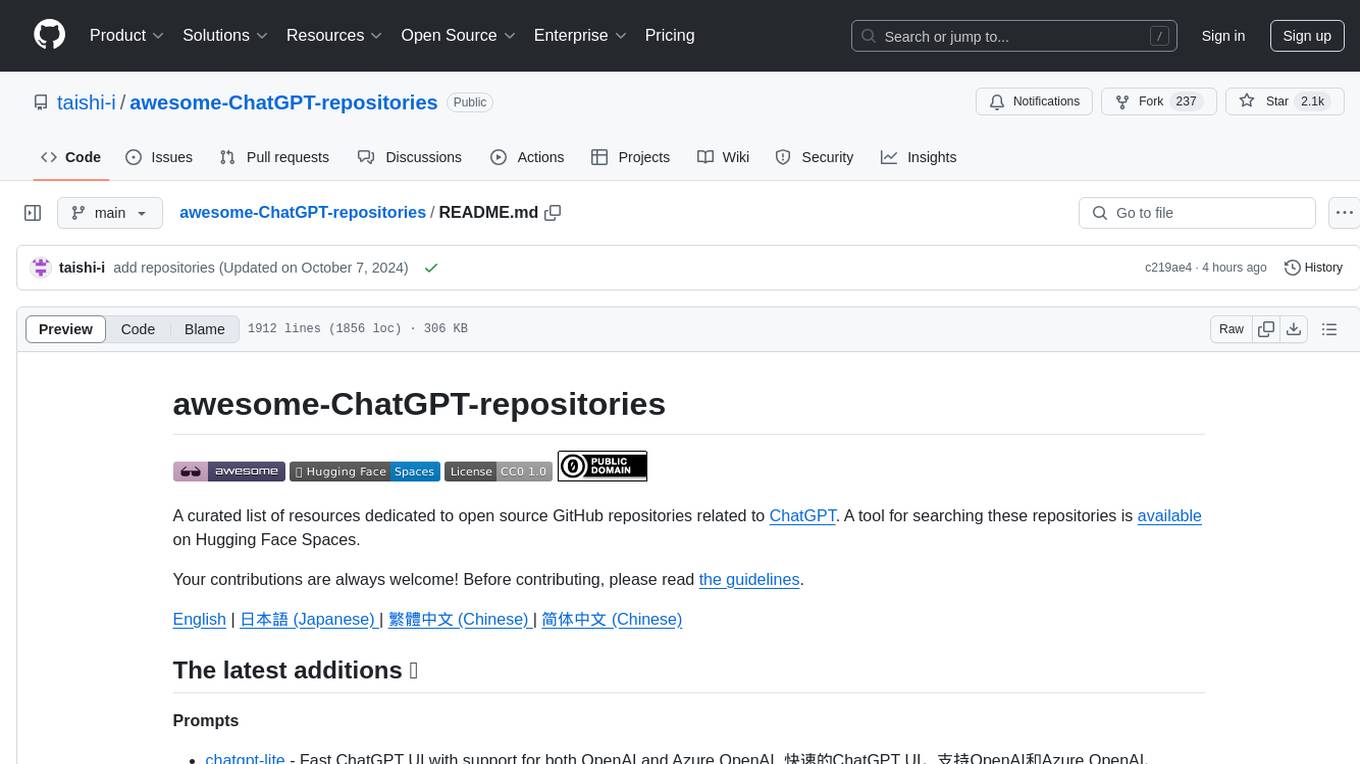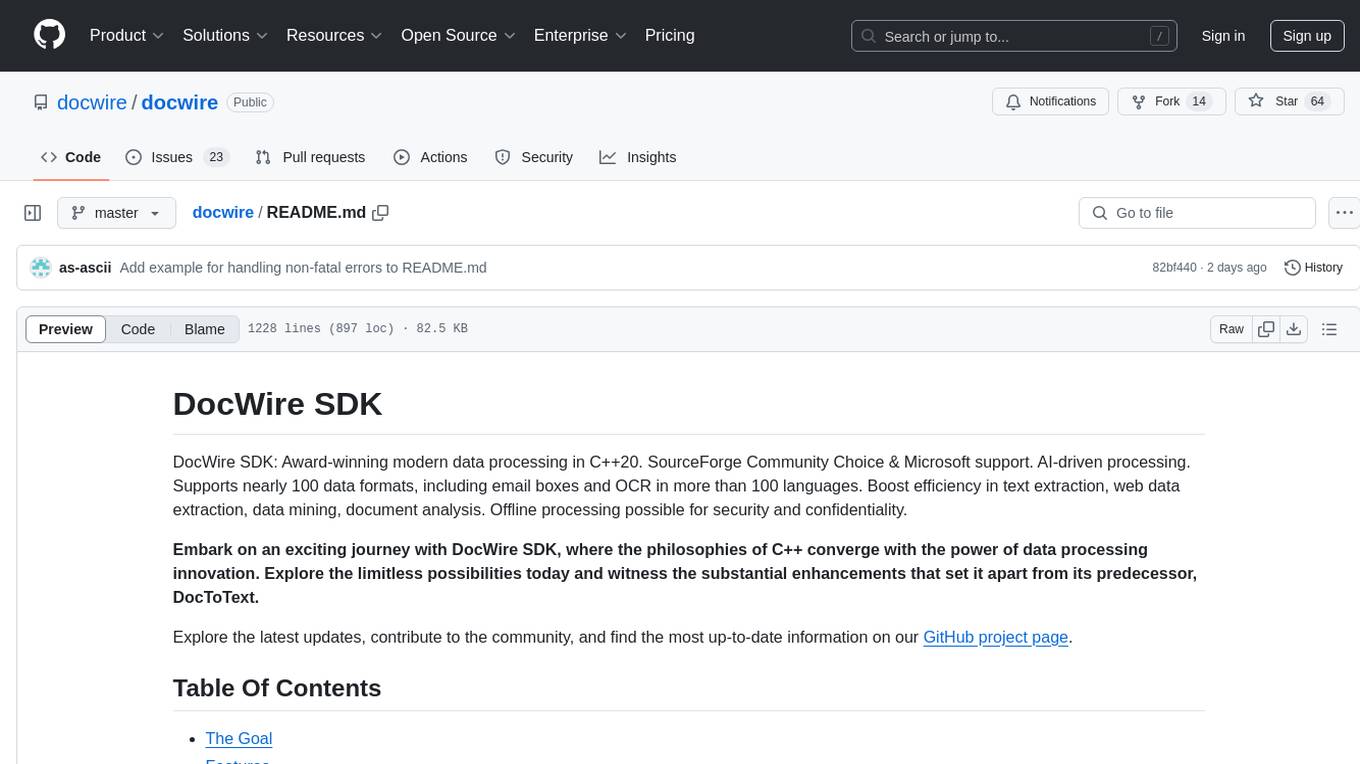
genkit
Open-source framework for building AI-powered apps in JavaScript, Go, and Python, built and used in production by Google
Stars: 5554

Firebase Genkit (beta) is a framework with powerful tooling to help app developers build, test, deploy, and monitor AI-powered features with confidence. Genkit is cloud optimized and code-centric, integrating with many services that have free tiers to get started. It provides unified API for generation, context-aware AI features, evaluation of AI workflow, extensibility with plugins, easy deployment to Firebase or Google Cloud, observability and monitoring with OpenTelemetry, and a developer UI for prototyping and testing AI features locally. Genkit works seamlessly with Firebase or Google Cloud projects through official plugins and templates.
README:
Genkit is an open-source framework for building full-stack AI-powered applications, built and used in production by Google's Firebase. It provides SDKs for multiple programming languages with varying levels of stability:
- JavaScript/TypeScript: Production-ready with full feature support
- Go: Production-ready with full feature support
- Python (Alpha): Early development with core functionality
It offers a unified interface for integrating AI models from providers like Google, OpenAI, Anthropic, Ollama, and more. Rapidly build and deploy production-ready chatbots, automations, and recommendation systems using streamlined APIs for multimodal content, structured outputs, tool calling, and agentic workflows.
Get started with just a few lines of code:
import { genkit } from 'genkit';
import { googleAI } from '@genkit-ai/google-genai';
const ai = genkit({ plugins: [googleAI()] });
const { text } = await ai.generate({
model: googleAI.model('gemini-2.5-flash'),
prompt: 'Why is Firebase awesome?'
});Play with AI sample apps, with visualizations of the Genkit code that powers them, at no cost to you.
| Broad AI model support | Use a unified interface to integrate with hundreds of models from providers like Google, OpenAI, Anthropic, Ollama, and more. Explore, compare, and use the best models for your needs. |
| Simplified AI development | Use streamlined APIs to build AI features with structured output, agentic tool calling, context-aware generation, multi-modal input/output, and more. Genkit handles the complexity of AI development, so you can build and iterate faster. |
| Web and mobile ready | Integrate seamlessly with frameworks and platforms including Next.js, React, Angular, iOS, Android, using purpose-built client SDKs and helpers. |
| Cross-language support | Build with the language that best fits your project. Genkit provides SDKs for JavaScript/TypeScript, Go, and Python (Alpha) with consistent APIs and capabilities across all supported languages. |
| Deploy anywhere | Deploy AI logic to any environment that supports your chosen programming language, such as Cloud Functions for Firebase, Google Cloud Run, or third-party platforms, with or without Google services. |
| Developer tools | Accelerate AI development with a purpose-built, local CLI and Developer UI. Test prompts and flows against individual inputs or datasets, compare outputs from different models, debug with detailed execution traces, and use immediate visual feedback to iterate rapidly on prompts. |
| Production monitoring | Ship AI features with confidence using comprehensive production monitoring. Track model performance, and request volumes, latency, and error rates in a purpose-built dashboard. Identify issues quickly with detailed observability metrics, and ensure your AI features meet quality and performance targets in real-world usage. |
Genkit simplifies AI integration with an open-source SDK and unified APIs that work across various model providers and programming languages. It abstracts away complexity so you can focus on delivering great user experiences.
Some key features offered by Genkit include:
- Text and image generation
- Type-safe, structured data generation
- Tool calling
- Prompt templating
- Persisted chat interfaces
- AI workflows
- AI-powered data retrieval (RAG)
Genkit is designed for server-side deployment in multiple language environments, and also provides seamless client-side integration through dedicated helpers and client SDKs.
| 1 | Choose your language and model provider | Select the Genkit SDK for your preferred language (JavaScript/TypeScript, Go, or Python (Alpha)). Choose a model provider like Google Gemini or Anthropic, and get an API key. Some providers, like Vertex AI, may rely on a different means of authentication. |
| 2 | Install the SDK and initialize | Install the Genkit SDK, model-provider package of your choice, and the Genkit CLI. Import the Genkit and provider packages and initialize Genkit with the provider API key. |
| 3 | Write and test AI features | Use the Genkit SDK to build AI features for your use case, from basic text generation to complex multi-step workflows and agents. Use the CLI and Developer UI to help you rapidly test and iterate. |
| 4 | Deploy and monitor | Deploy your AI features to Firebase, Google Cloud Run, or any environment that supports your chosen programming language. Integrate them into your app, and monitor them in production in the Firebase console. |
Genkit provides a CLI and a local UI to streamline your AI development workflow.
The Genkit CLI includes commands for running and evaluating your Genkit functions (flows) and collecting telemetry and logs.
-
Install:
npm install -g genkit-cli -
Run a command, wrapped with telemetry, a interactive developer UI, etc:
genkit start -- <command to run your code>
The Genkit developer UI is a local interface for testing, debugging, and iterating on your AI application.
Key features:
- Run: Execute and experiment with Genkit flows, prompts, queries, and more in dedicated playgrounds.
- Inspect: Analyze detailed traces of past executions, including step-by-step breakdowns of complex flows.
- Evaluate: Review the results of evaluations run against your flows, including performance metrics and links to relevant traces.
Want to skip the local setup? Click below to try out Genkit using Firebase Studio, Google's AI-assisted workspace for full-stack app development in the cloud.
- Join us on Discord – Get help, share ideas, and chat with other developers.
- Contribute on GitHub – Report bugs, suggest features, or explore the source code.
- Contribute to Documentation and Samples – Report issues in Genkit's documentation, or contribute to the samples.
Contributions to Genkit are welcome and highly appreciated! See our Contribution Guide to get started.
Genkit is built by Firebase with contributions from the Open Source Community.
For Tasks:
Click tags to check more tools for each tasksFor Jobs:
Alternative AI tools for genkit
Similar Open Source Tools

genkit
Firebase Genkit (beta) is a framework with powerful tooling to help app developers build, test, deploy, and monitor AI-powered features with confidence. Genkit is cloud optimized and code-centric, integrating with many services that have free tiers to get started. It provides unified API for generation, context-aware AI features, evaluation of AI workflow, extensibility with plugins, easy deployment to Firebase or Google Cloud, observability and monitoring with OpenTelemetry, and a developer UI for prototyping and testing AI features locally. Genkit works seamlessly with Firebase or Google Cloud projects through official plugins and templates.

Genkit
Genkit is an open-source framework for building full-stack AI-powered applications, used in production by Google's Firebase. It provides SDKs for JavaScript/TypeScript (Stable), Go (Beta), and Python (Alpha) with unified interface for integrating AI models from providers like Google, OpenAI, Anthropic, Ollama. Rapidly build chatbots, automations, and recommendation systems using streamlined APIs for multimodal content, structured outputs, tool calling, and agentic workflows. Genkit simplifies AI integration with open-source SDK, unified APIs, and offers text and image generation, structured data generation, tool calling, prompt templating, persisted chat interfaces, AI workflows, and AI-powered data retrieval (RAG).
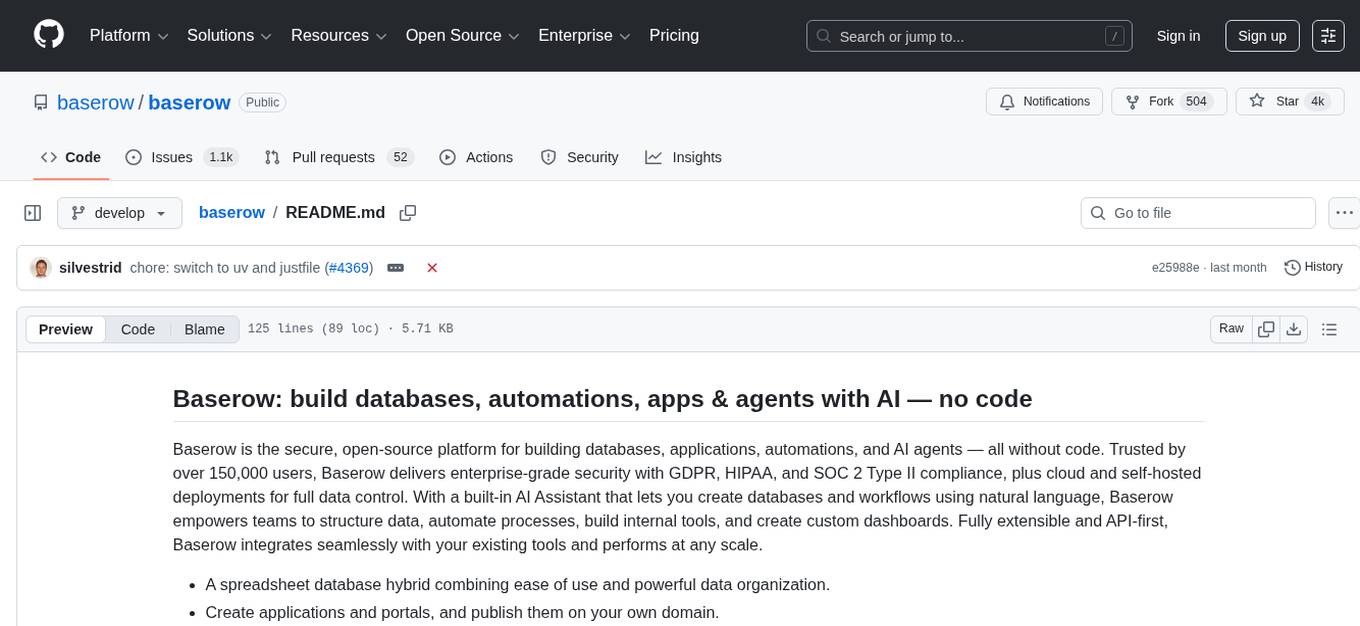
baserow
Baserow is a secure, open-source platform that allows users to build databases, applications, automations, and AI agents without writing any code. With enterprise-grade security compliance and both cloud and self-hosted deployment options, Baserow empowers teams to structure data, automate processes, create internal tools, and build custom dashboards. It features a spreadsheet database hybrid, AI Assistant for natural language database creation, GDPR, HIPAA, and SOC 2 Type II compliance, and seamless integration with existing tools. Baserow is API-first, extensible, and uses frameworks like Django, Vue.js, and PostgreSQL.
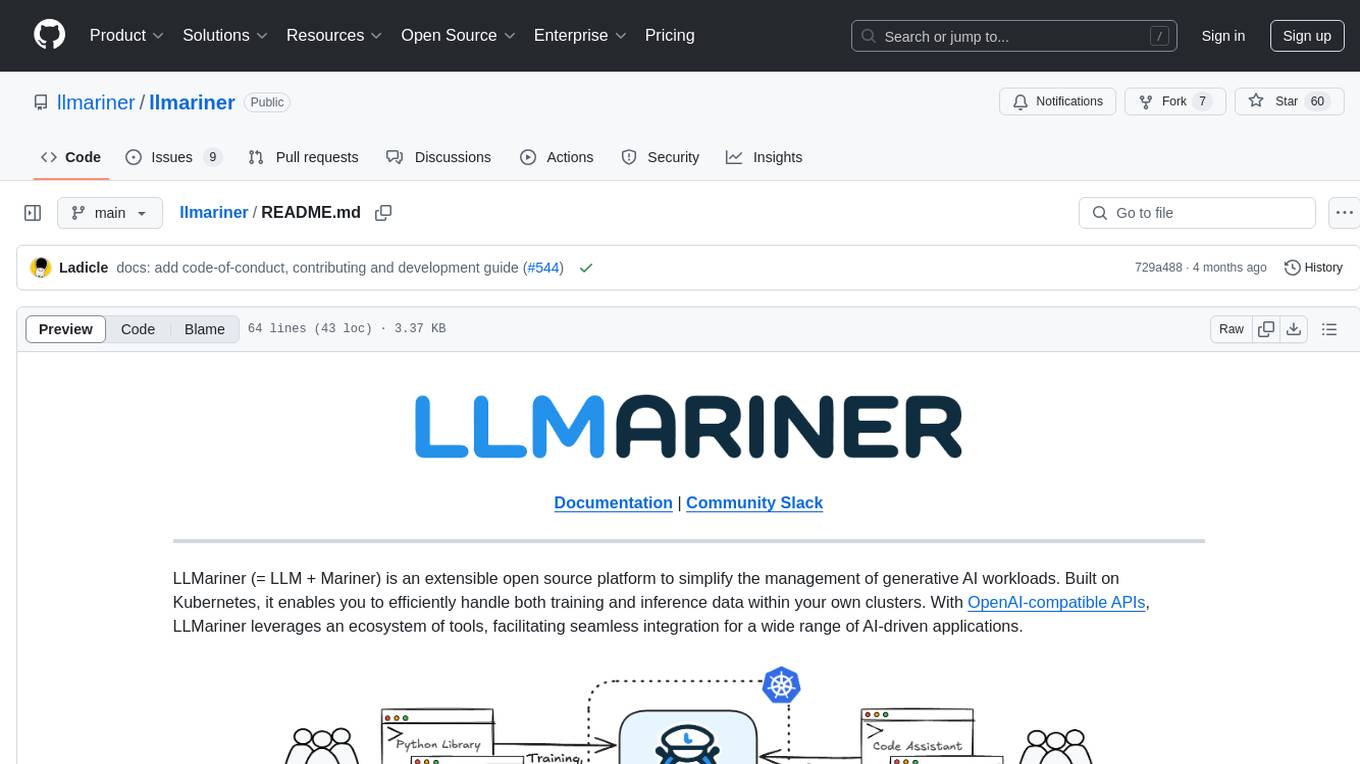
llmariner
LLMariner is an extensible open source platform built on Kubernetes to simplify the management of generative AI workloads. It enables efficient handling of training and inference data within clusters, with OpenAI-compatible APIs for seamless integration with a wide range of AI-driven applications.
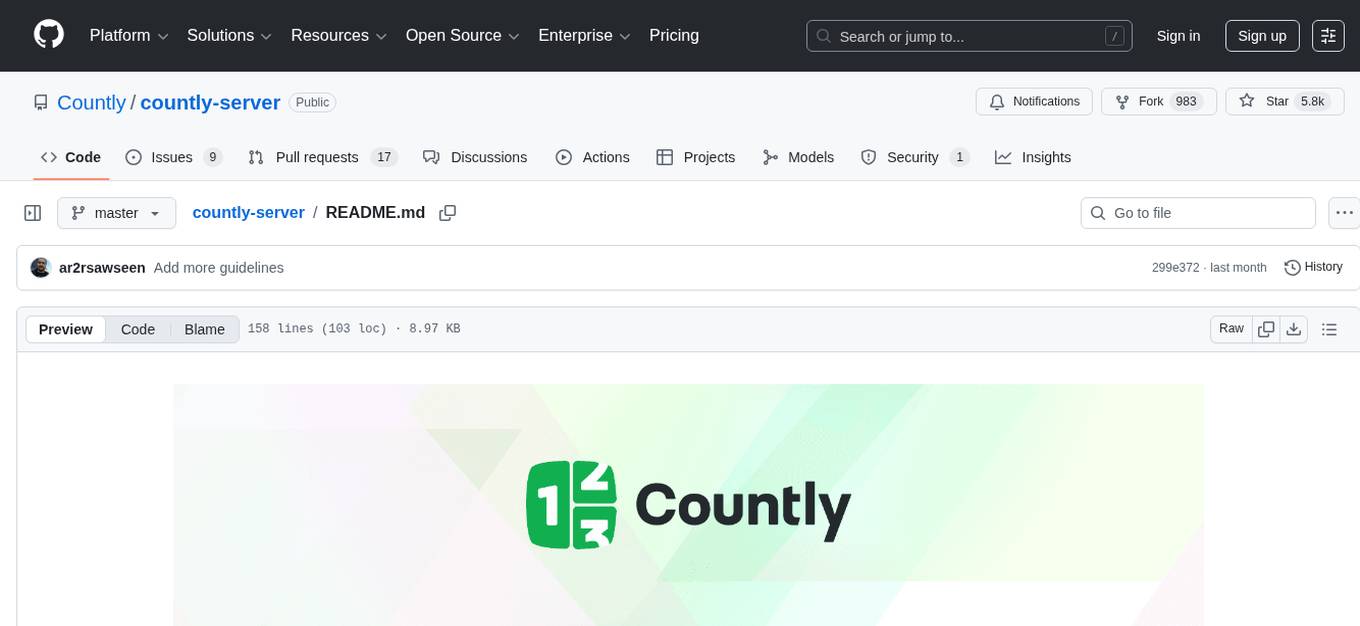
countly-server
Countly is a privacy-first, AI-ready analytics and customer engagement platform built for organizations that require full data ownership and deployment flexibility. It can be deployed on-premises or in a private cloud, giving complete control over data, infrastructure, compliance, and security. Teams use Countly to understand user behavior across mobile, web, desktop, and connected devices, optimize product and customer experiences in real time, and automate and personalize customer engagement across channels. With flexible data tracking, customizable dashboards, and a modular plugin-based architecture, Countly scales with the product while ensuring long-term autonomy and zero vendor lock-in. Built for privacy, designed for flexibility, and ready for AI-driven innovation.
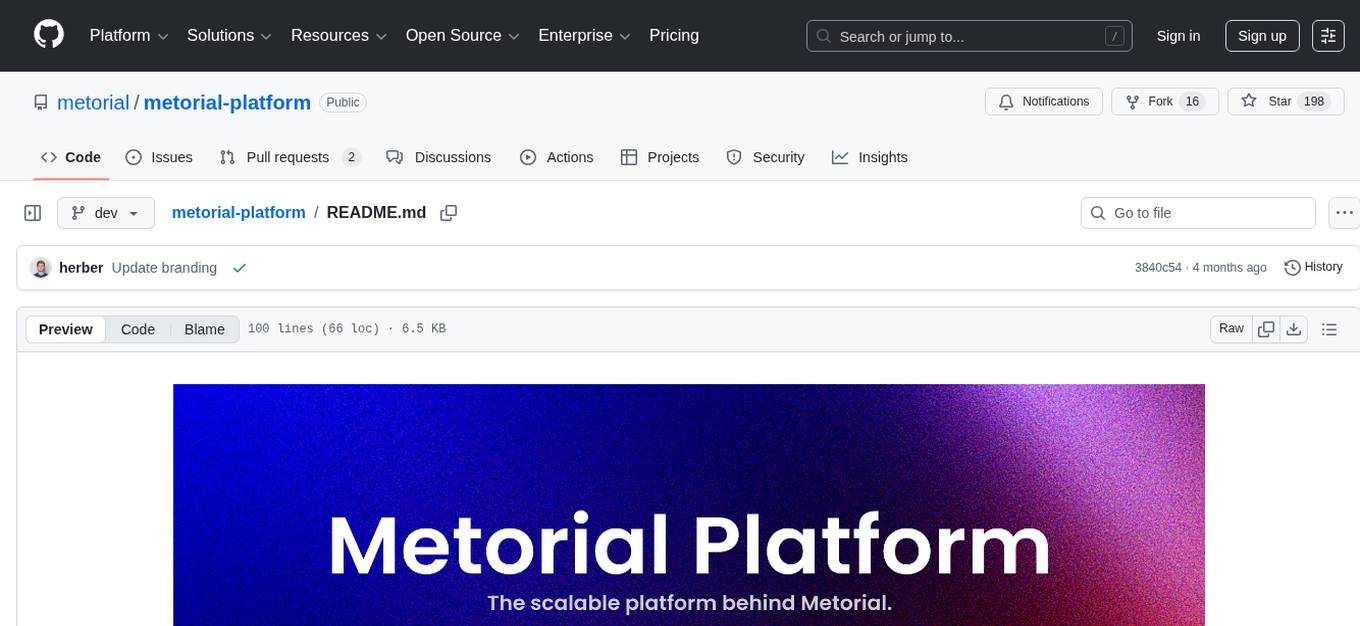
metorial-platform
Metorial Platform is an open source integration platform designed for developers to easily connect their AI applications to external data sources, APIs, and tools. It provides one-liner SDKs for JavaScript/TypeScript and Python, is powered by the Model Context Protocol (MCP), and offers features like self-hosting, large server catalog, embedded MCP Explorer, monitoring and debugging capabilities. The platform is built to scale for enterprise-grade applications and offers customizable options, open-source flexibility, multi-instance support, powerful SDKs, detailed documentation, full API access, and an advanced dashboard for managing integrations.
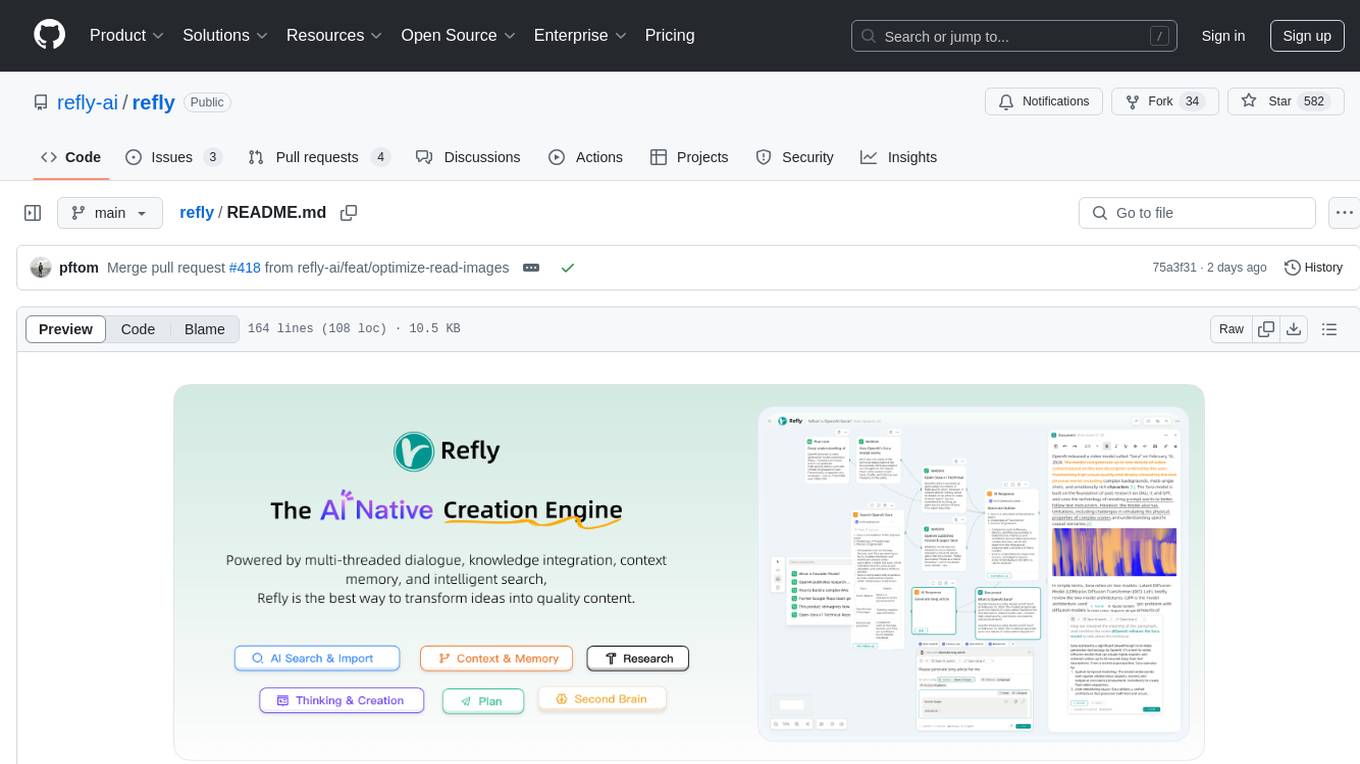
refly
Refly.AI is an open-source AI-native creation engine that empowers users to transform ideas into production-ready content. It features a free-form canvas interface with multi-threaded conversations, knowledge base integration, contextual memory, intelligent search, WYSIWYG AI editor, and more. Users can leverage AI-powered capabilities, context memory, knowledge base integration, quotes, and AI document editing to enhance their content creation process. Refly offers both cloud and self-hosting options, making it suitable for individuals, enterprises, and organizations. The tool is designed to facilitate human-AI collaboration and streamline content creation workflows.
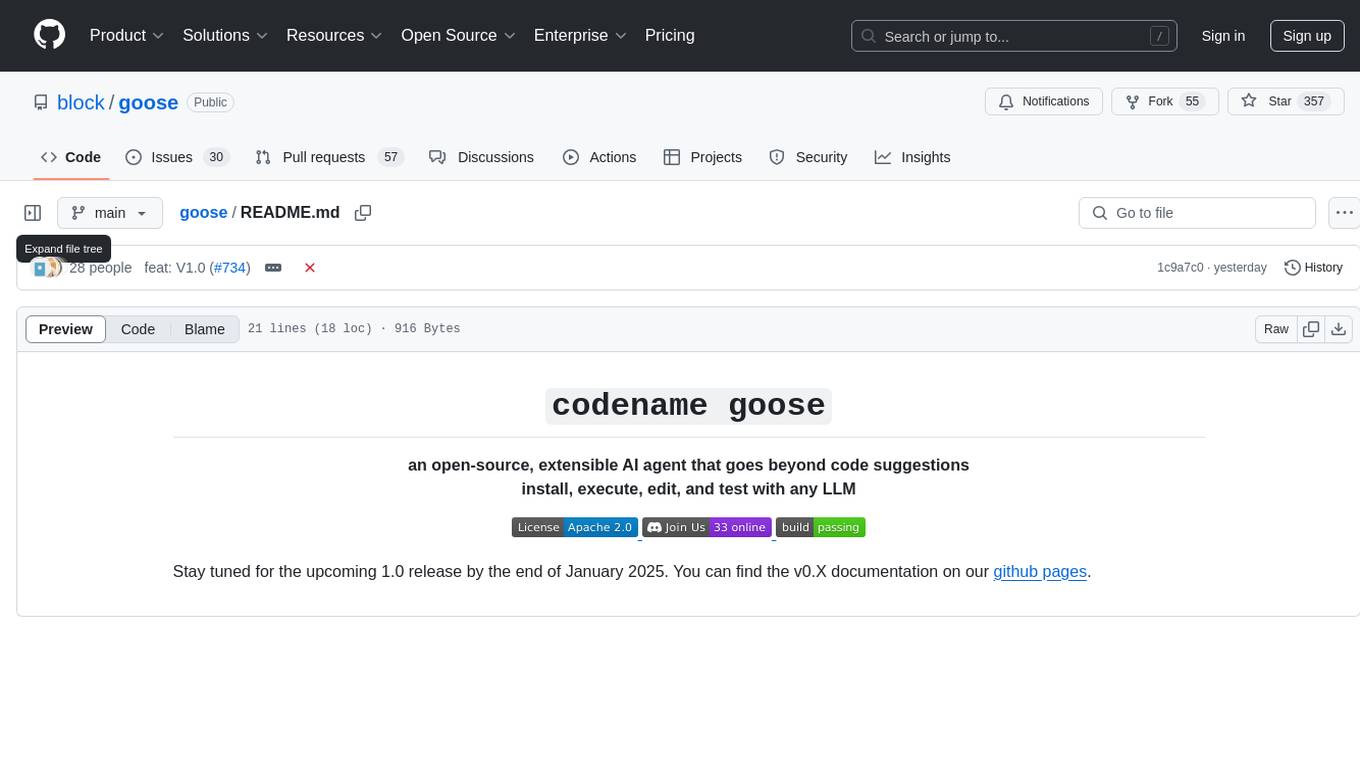
goose
Codename Goose is an open-source, extensible AI agent designed to provide functionalities beyond code suggestions. Users can install, execute, edit, and test with any LLM. The tool aims to enhance the coding experience by offering advanced features and capabilities. Stay updated for the upcoming 1.0 release scheduled by the end of January 2025. Explore the v0.X documentation available on the project's GitHub pages.
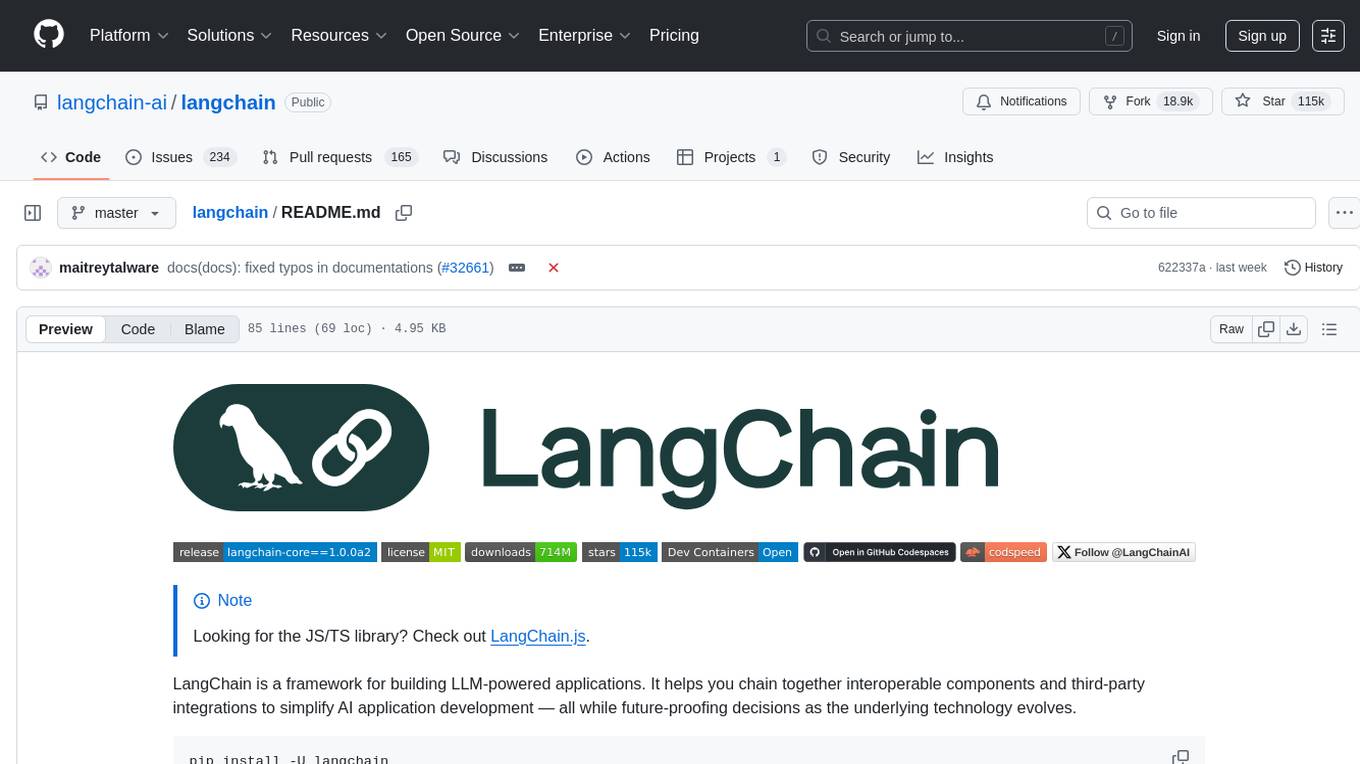
langchain
LangChain is a framework for building LLM-powered applications that simplifies AI application development by chaining together interoperable components and third-party integrations. It helps developers connect LLMs to diverse data sources, swap models easily, and future-proof decisions as technology evolves. LangChain's ecosystem includes tools like LangSmith for agent evals, LangGraph for complex task handling, and LangGraph Platform for deployment and scaling. Additional resources include tutorials, how-to guides, conceptual guides, a forum, API reference, and chat support.

openvino
OpenVINO™ is an open-source toolkit for optimizing and deploying AI inference. It provides a common API to deliver inference solutions on various platforms, including CPU, GPU, NPU, and heterogeneous devices. OpenVINO™ supports pre-trained models from Open Model Zoo and popular frameworks like TensorFlow, PyTorch, and ONNX. Key components of OpenVINO™ include the OpenVINO™ Runtime, plugins for different hardware devices, frontends for reading models from native framework formats, and the OpenVINO Model Converter (OVC) for adjusting models for optimal execution on target devices.

buildel
Buildel is an AI automation platform that empowers users to create versatile workflows without writing code. It supports multiple providers and interfaces, offers pre-built use cases, and allows users to bring their own API keys. Ideal for AI-powered document retrieval, conversational interfaces, and data integration. Users can get started at app.buildel.ai or run Buildel locally with Node.js, Elixir/Erlang, Docker, Git, and JQ installed. Join the community on Discord for support and discussions.
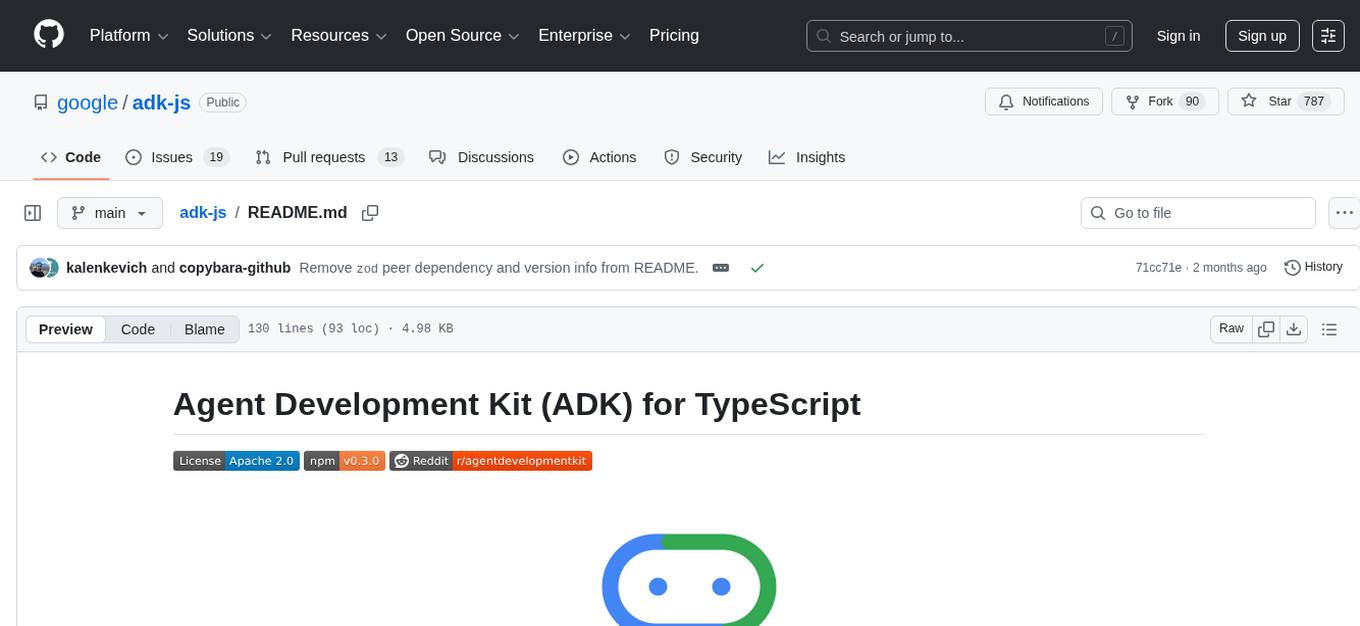
adk-js
Agent Development Kit (ADK) for TypeScript is an open-source toolkit designed for developers to build, evaluate, and deploy sophisticated AI agents with flexibility and control. It allows defining agent behavior, orchestration, and tool use directly in code for robust debugging, versioning, and deployment. With rich tool ecosystem, code-first development, and modular multi-agent systems, ADK offers tight integration with the Google ecosystem and enables the creation of scalable applications by composing multiple specialized agents into flexible hierarchies.

Geoweaver
Geoweaver is an in-browser software that enables users to easily compose and execute full-stack data processing workflows using online spatial data facilities, high-performance computation platforms, and open-source deep learning libraries. It provides server management, code repository, workflow orchestration software, and history recording capabilities. Users can run it from both local and remote machines. Geoweaver aims to make data processing workflows manageable for non-coder scientists and preserve model run history. It offers features like progress storage, organization, SSH connection to external servers, and a web UI with Python support.
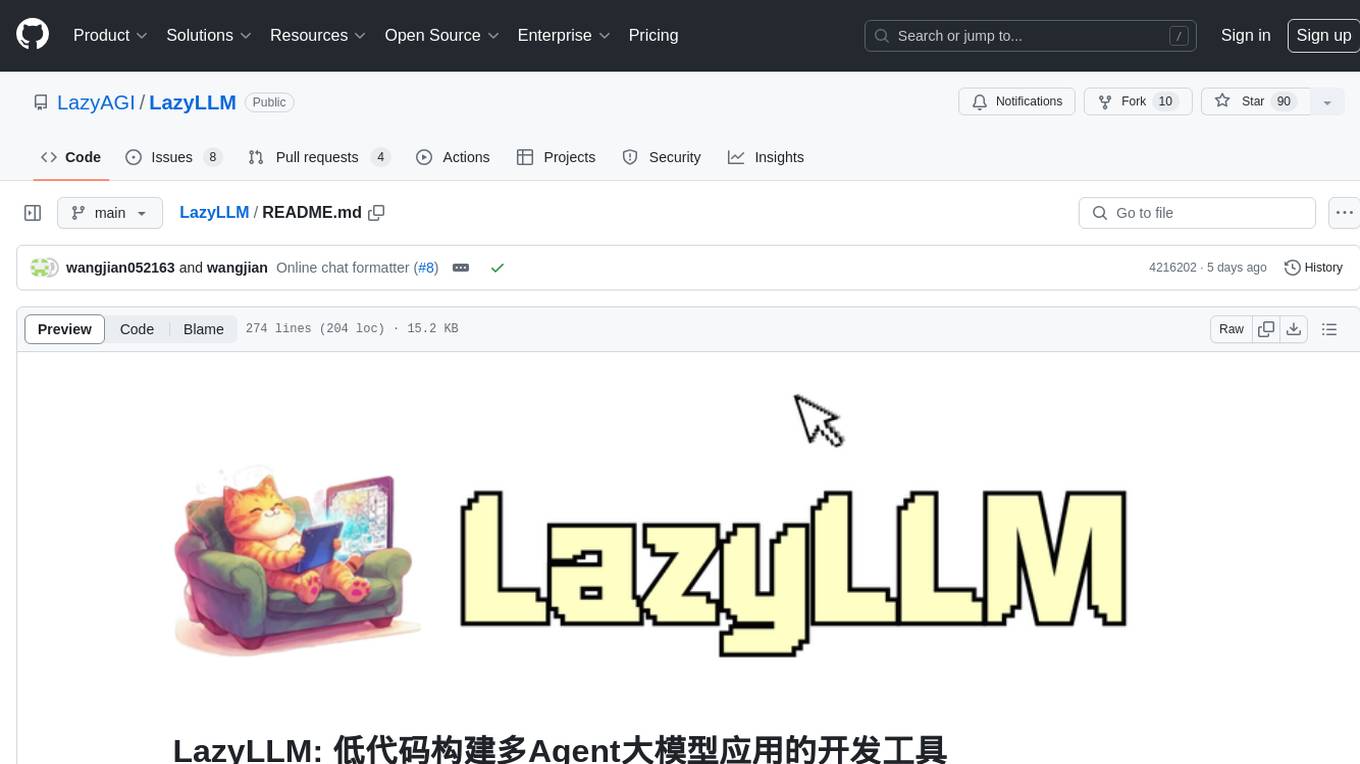
LazyLLM
LazyLLM is a low-code development tool for building complex AI applications with multiple agents. It assists developers in building AI applications at a low cost and continuously optimizing their performance. The tool provides a convenient workflow for application development and offers standard processes and tools for various stages of application development. Users can quickly prototype applications with LazyLLM, analyze bad cases with scenario task data, and iteratively optimize key components to enhance the overall application performance. LazyLLM aims to simplify the AI application development process and provide flexibility for both beginners and experts to create high-quality applications.
For similar tasks
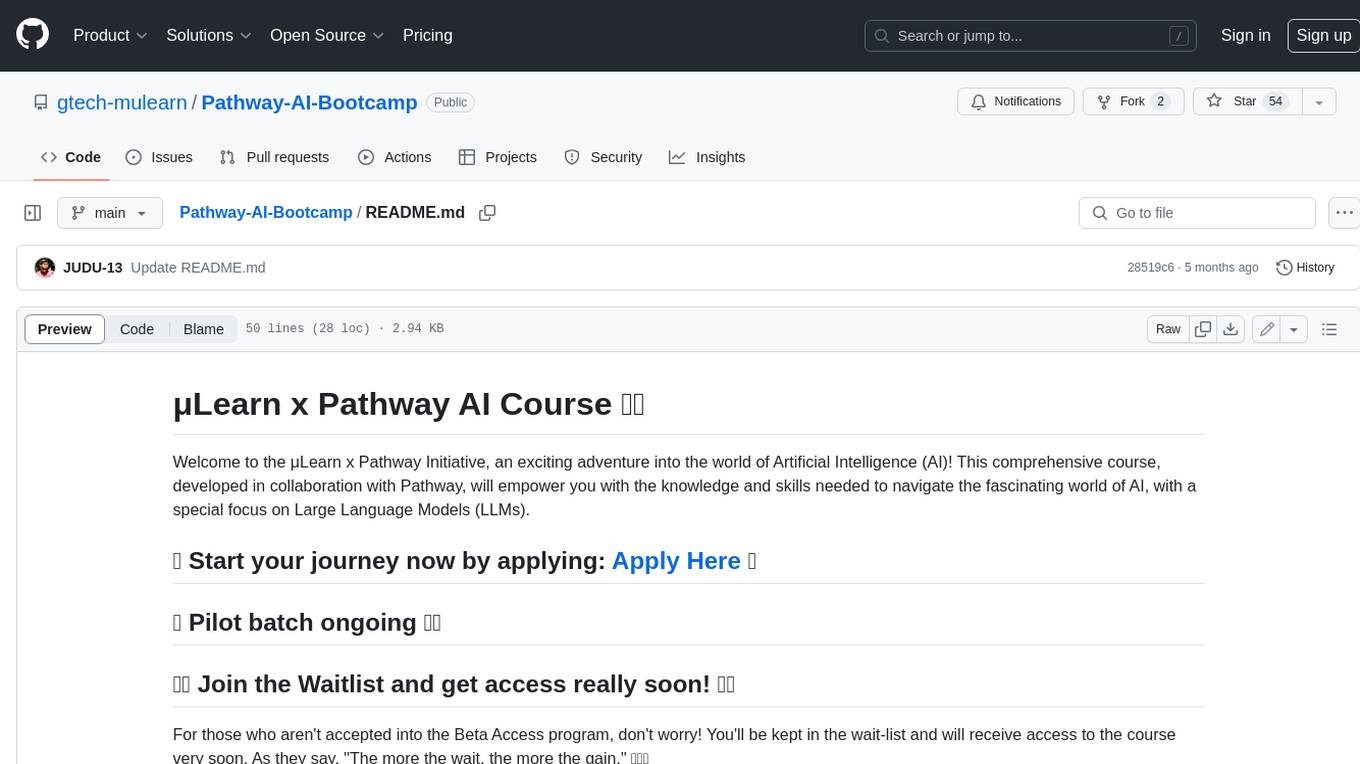
Pathway-AI-Bootcamp
Welcome to the μLearn x Pathway Initiative, an exciting adventure into the world of Artificial Intelligence (AI)! This comprehensive course, developed in collaboration with Pathway, will empower you with the knowledge and skills needed to navigate the fascinating world of AI, with a special focus on Large Language Models (LLMs).
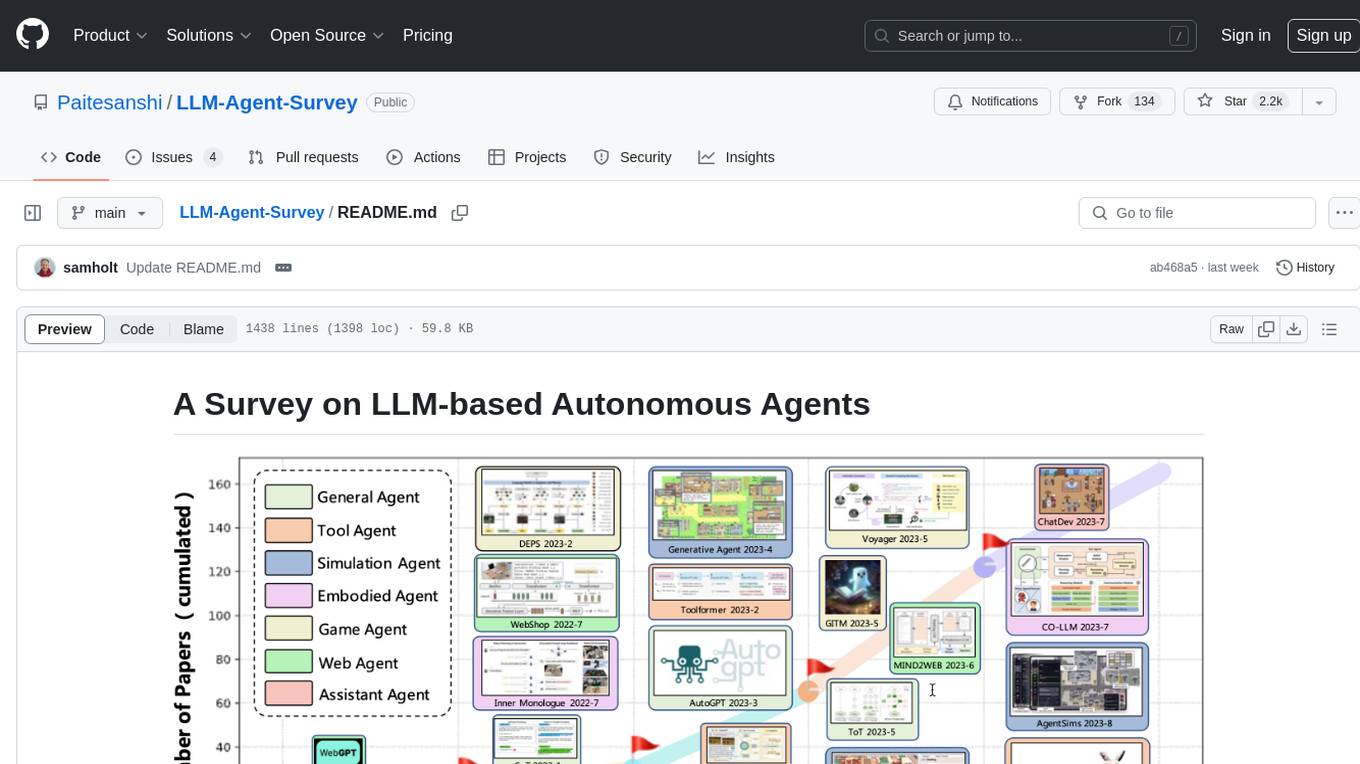
LLM-Agent-Survey
Autonomous agents are designed to achieve specific objectives through self-guided instructions. With the emergence and growth of large language models (LLMs), there is a growing trend in utilizing LLMs as fundamental controllers for these autonomous agents. This repository conducts a comprehensive survey study on the construction, application, and evaluation of LLM-based autonomous agents. It explores essential components of AI agents, application domains in natural sciences, social sciences, and engineering, and evaluation strategies. The survey aims to be a resource for researchers and practitioners in this rapidly evolving field.

genkit
Firebase Genkit (beta) is a framework with powerful tooling to help app developers build, test, deploy, and monitor AI-powered features with confidence. Genkit is cloud optimized and code-centric, integrating with many services that have free tiers to get started. It provides unified API for generation, context-aware AI features, evaluation of AI workflow, extensibility with plugins, easy deployment to Firebase or Google Cloud, observability and monitoring with OpenTelemetry, and a developer UI for prototyping and testing AI features locally. Genkit works seamlessly with Firebase or Google Cloud projects through official plugins and templates.
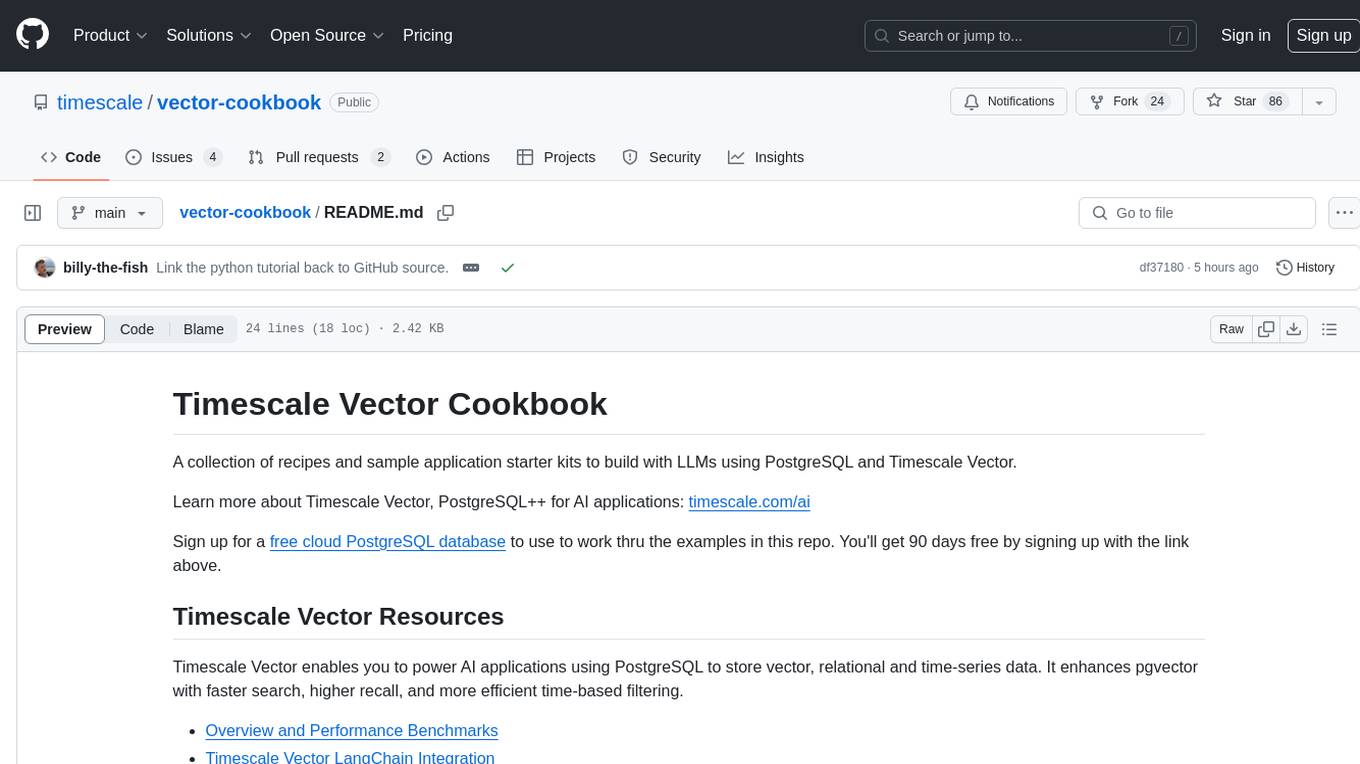
vector-cookbook
The Vector Cookbook is a collection of recipes and sample application starter kits for building AI applications with LLMs using PostgreSQL and Timescale Vector. Timescale Vector enhances PostgreSQL for AI applications by enabling the storage of vector, relational, and time-series data with faster search, higher recall, and more efficient time-based filtering. The repository includes resources, sample applications like TSV Time Machine, and guides for creating, storing, and querying OpenAI embeddings with PostgreSQL and pgvector. Users can learn about Timescale Vector, explore performance benchmarks, and access Python client libraries and tutorials.
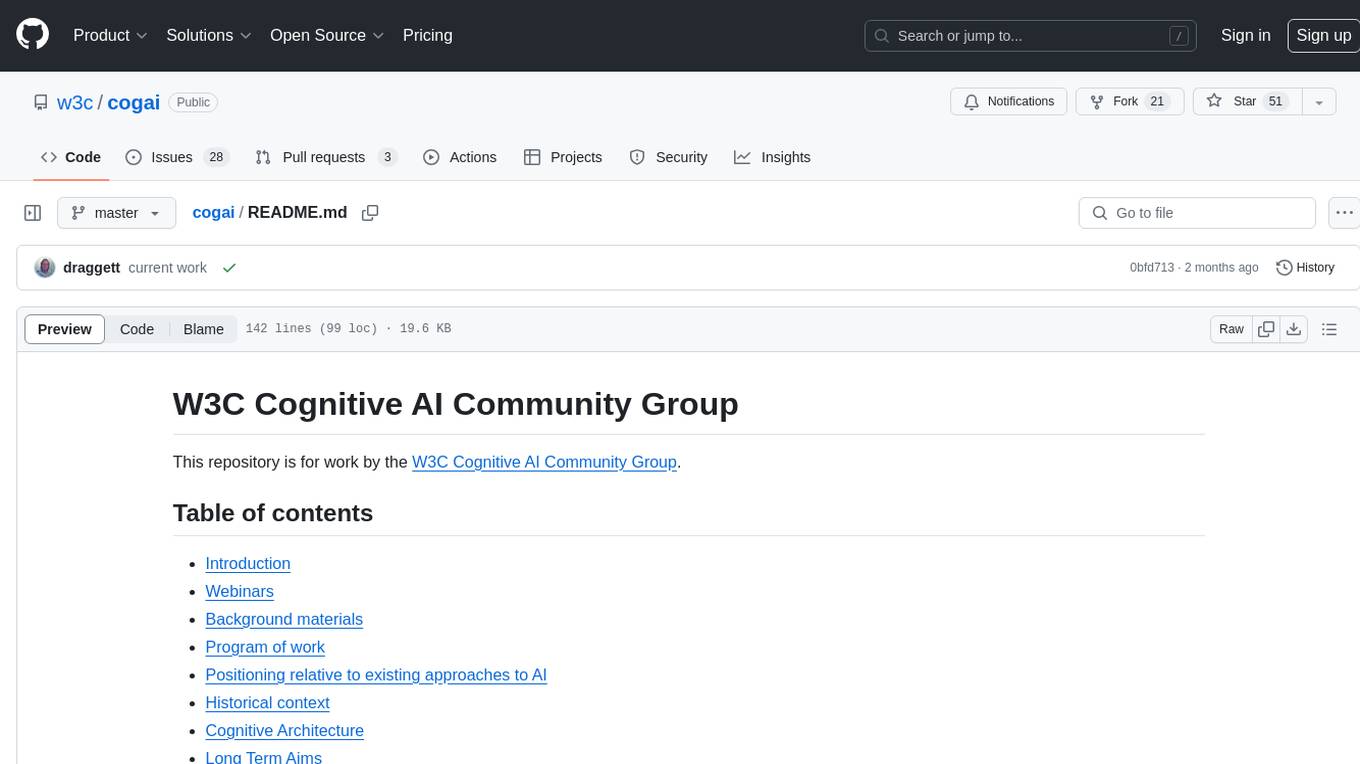
cogai
The W3C Cognitive AI Community Group focuses on advancing Cognitive AI through collaboration on defining use cases, open source implementations, and application areas. The group aims to demonstrate the potential of Cognitive AI in various domains such as customer services, healthcare, cybersecurity, online learning, autonomous vehicles, manufacturing, and web search. They work on formal specifications for chunk data and rules, plausible knowledge notation, and neural networks for human-like AI. The group positions Cognitive AI as a combination of symbolic and statistical approaches inspired by human thought processes. They address research challenges including mimicry, emotional intelligence, natural language processing, and common sense reasoning. The long-term goal is to develop cognitive agents that are knowledgeable, creative, collaborative, empathic, and multilingual, capable of continual learning and self-awareness.
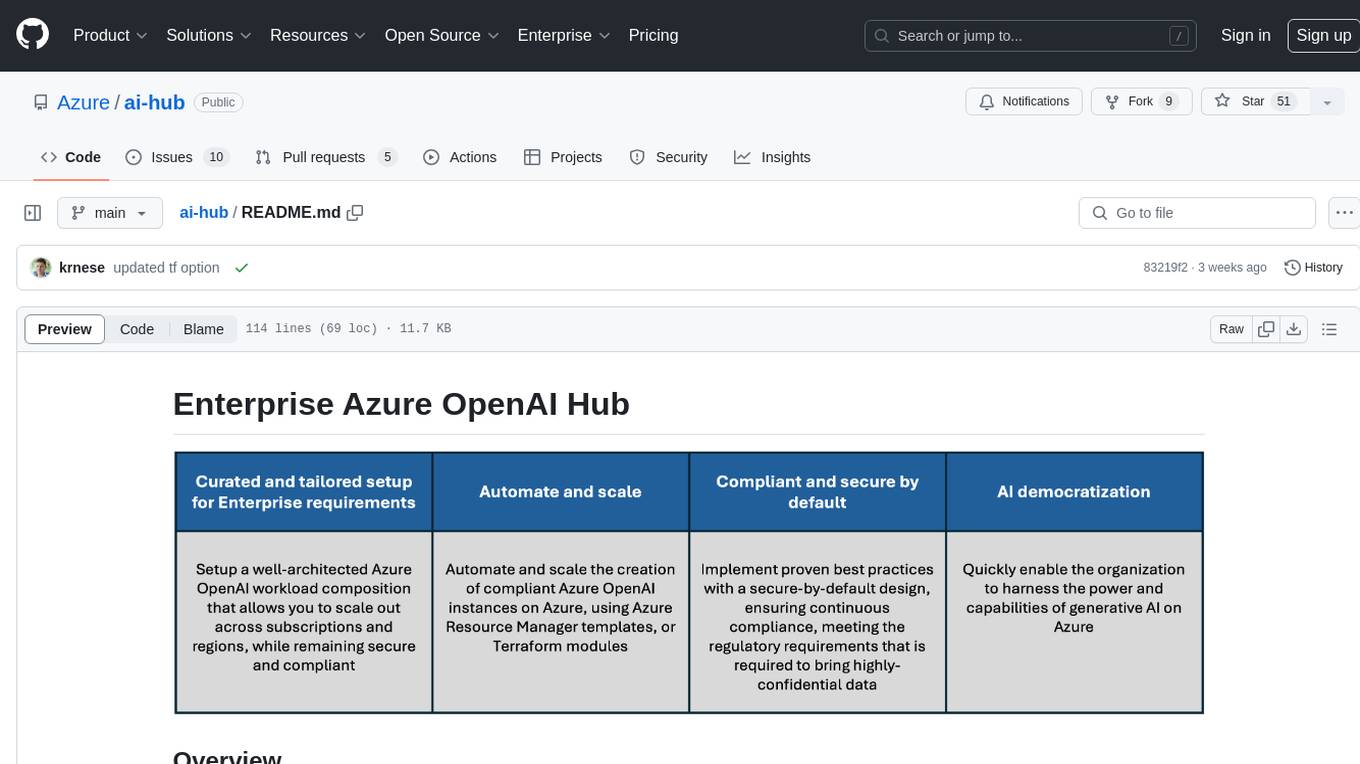
ai-hub
The Enterprise Azure OpenAI Hub is a comprehensive repository designed to guide users through the world of Generative AI on the Azure platform. It offers a structured learning experience to accelerate the transition from concept to production in an Enterprise context. The hub empowers users to explore various use cases with Azure services, ensuring security and compliance. It provides real-world examples and playbooks for practical insights into solving complex problems and developing cutting-edge AI solutions. The repository also serves as a library of proven patterns, aligning with industry standards and promoting best practices for secure and compliant AI development.
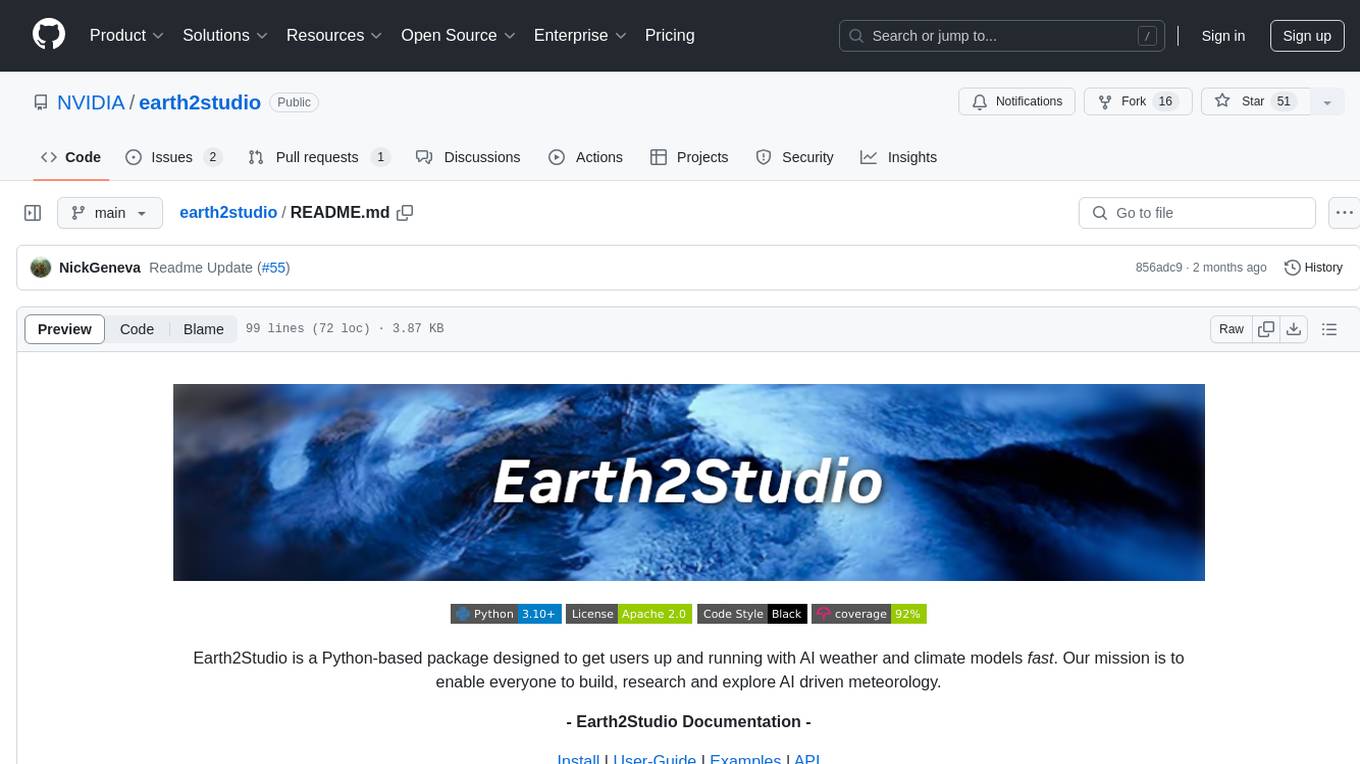
earth2studio
Earth2Studio is a Python-based package designed to enable users to quickly get started with AI weather and climate models. It provides access to pre-trained models, diagnostic tools, data sources, IO utilities, perturbation methods, and sample workflows for building custom weather prediction workflows. The package aims to empower users to explore AI-driven meteorology through modular components and seamless integration with other Nvidia packages like Modulus.
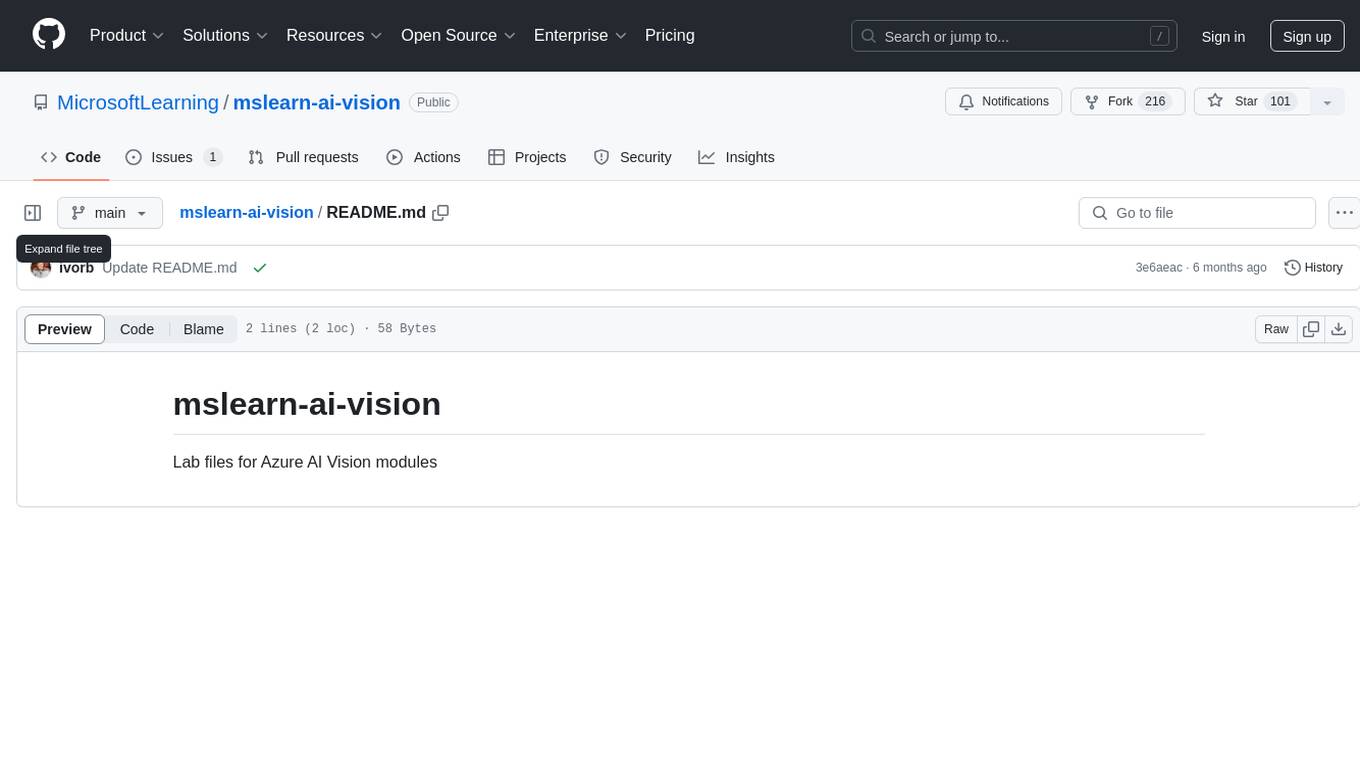
mslearn-ai-vision
The 'mslearn-ai-vision' repository contains lab files for Azure AI Vision modules. It provides hands-on exercises and resources for learning about AI vision capabilities on the Azure platform. The labs cover topics such as image recognition, object detection, and image classification using Azure's AI services. By following the lab exercises, users can gain practical experience in building and deploying AI vision solutions in the cloud.
For similar jobs

sweep
Sweep is an AI junior developer that turns bugs and feature requests into code changes. It automatically handles developer experience improvements like adding type hints and improving test coverage.

teams-ai
The Teams AI Library is a software development kit (SDK) that helps developers create bots that can interact with Teams and Microsoft 365 applications. It is built on top of the Bot Framework SDK and simplifies the process of developing bots that interact with Teams' artificial intelligence capabilities. The SDK is available for JavaScript/TypeScript, .NET, and Python.

ai-guide
This guide is dedicated to Large Language Models (LLMs) that you can run on your home computer. It assumes your PC is a lower-end, non-gaming setup.

classifai
Supercharge WordPress Content Workflows and Engagement with Artificial Intelligence. Tap into leading cloud-based services like OpenAI, Microsoft Azure AI, Google Gemini and IBM Watson to augment your WordPress-powered websites. Publish content faster while improving SEO performance and increasing audience engagement. ClassifAI integrates Artificial Intelligence and Machine Learning technologies to lighten your workload and eliminate tedious tasks, giving you more time to create original content that matters.

chatbot-ui
Chatbot UI is an open-source AI chat app that allows users to create and deploy their own AI chatbots. It is easy to use and can be customized to fit any need. Chatbot UI is perfect for businesses, developers, and anyone who wants to create a chatbot.

BricksLLM
BricksLLM is a cloud native AI gateway written in Go. Currently, it provides native support for OpenAI, Anthropic, Azure OpenAI and vLLM. BricksLLM aims to provide enterprise level infrastructure that can power any LLM production use cases. Here are some use cases for BricksLLM: * Set LLM usage limits for users on different pricing tiers * Track LLM usage on a per user and per organization basis * Block or redact requests containing PIIs * Improve LLM reliability with failovers, retries and caching * Distribute API keys with rate limits and cost limits for internal development/production use cases * Distribute API keys with rate limits and cost limits for students

uAgents
uAgents is a Python library developed by Fetch.ai that allows for the creation of autonomous AI agents. These agents can perform various tasks on a schedule or take action on various events. uAgents are easy to create and manage, and they are connected to a fast-growing network of other uAgents. They are also secure, with cryptographically secured messages and wallets.

griptape
Griptape is a modular Python framework for building AI-powered applications that securely connect to your enterprise data and APIs. It offers developers the ability to maintain control and flexibility at every step. Griptape's core components include Structures (Agents, Pipelines, and Workflows), Tasks, Tools, Memory (Conversation Memory, Task Memory, and Meta Memory), Drivers (Prompt and Embedding Drivers, Vector Store Drivers, Image Generation Drivers, Image Query Drivers, SQL Drivers, Web Scraper Drivers, and Conversation Memory Drivers), Engines (Query Engines, Extraction Engines, Summary Engines, Image Generation Engines, and Image Query Engines), and additional components (Rulesets, Loaders, Artifacts, Chunkers, and Tokenizers). Griptape enables developers to create AI-powered applications with ease and efficiency.



